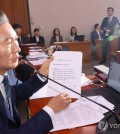- California Assembly OKs highest minimum wage in nation
- S. Korea unveils first graphic cigarette warnings
- US joins with South Korea, Japan in bid to deter North Korea
- LPGA golfer Chun In-gee finally back in action
- S. Korea won’t be top seed in final World Cup qualification round
- US men’s soccer misses 2nd straight Olympics
- US back on track in qualifying with 4-0 win over Guatemala
- High-intensity workout injuries spawn cottage industry
- CDC expands range of Zika mosquitoes into parts of Northeast
- Who knew? ‘The Walking Dead’ is helping families connect
Nuclear reactors shut down following deadly chemical leak
ULSAN (Yonhap) — The labor ministry has ordered two nuclear reactors under construction to be shut down to look into the cause of a toxic gas leak that killed three workers.
Three workers died Friday apparently after inhaling toxic gas at the construction site of a nuclear reactor in Ulsan, about 410 kilometers southeast of Seoul.
The state-run Korea Hydro and Nuclear Power Co. earlier said it suspected nitrogen gas leaked from an underground cable caused the deaths.
The ministry said it will cooperate with the occupational safety agency, the emergency management agency and police to conduct a joint probe into the site and summon officials at the state nuclear power company and contractors.
“We will promptly conduct an investigation and hold accountable those who are responsible (in the incident) if any irregularities are discovered,” Yoo Han-bong, who leads the labor ministry’s Ulsan branch, said.
The New Gori No. 3 reactor with a rated capacity of 1,400 megawatts was 99 percent complete for full operation scheduled for next June, and was undergoing a test run since last month to receive approval from the state nuclear watchdog. The New Gori No. 4 reactor was 98 percent complete, with commercial operation slated for 2016.
The accident came days after the state nuclear power operator suffered a series of cyber attacks that raised safety concerns in a country that relies on 23 nuclear reactors for one-third of its energy needs.
Over the past week, an anonymous anti-nuclear group posted a series of documents and operating manuals for a number of South Korean nuclear reactors on the Internet.
On Wednesday, a joint investigation team of government and prosecution officials said a suspect in the hacking attack was found to have used multiple Internet protocol addresses — the online equivalent of a street address or a phone number — based in China.
South Korean officials have not ruled out the possible involvement of North Korea, which has a track record of waging cyber attacks on major financial institutions, government web sites and media organizations in South Korea. North Korea has flatly denied any involvement.















